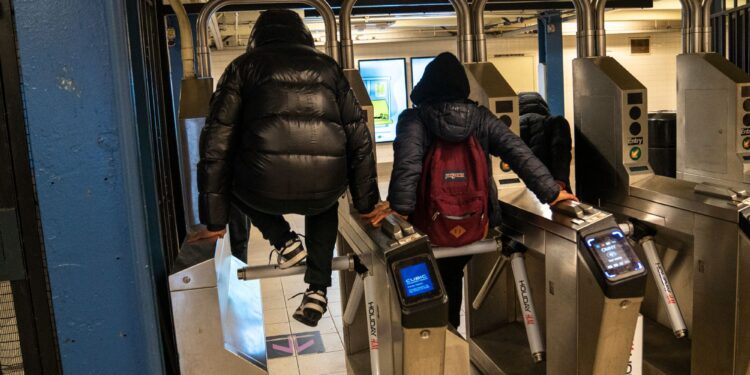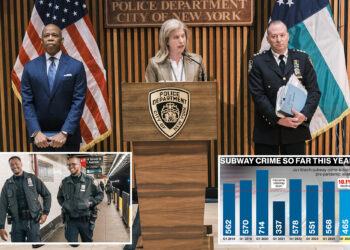
Nearly half of New York City’s two million bus riders evaded paying fares over the last three months, a pattern that helps explain why the MTA reportedly hemorrhaged over $300 million due to bus freeloaders in the last year.
Law-abiding New Yorkers will pay for this type of revenue loss in the form of fare hikes and tax increases.
But just deploying more NYPD officers and fare-enforcement agents to combat fare evasion — as the transit authority announced last month they will do — won’t fix the problem.
Until Albany amends the 2020 “discovery law,” the actual consequences for farebeating won’t be enough to convince delinquents to cough up the $2.90 per ride.
In the state of New York, prosecuting “minor” crimes, like fare evasion, has become impossible under discovery reform, which advantages offenders often insurmountably.
Importantly, this is separate from the explicit policies for declining to prosecute fare evasion that district attorneys in Manhattan, Brooklyn and the Bronx have adopted since 2017.
The discovery law does not restrict the robust prosecution of farebeating. Instead, it imposes a compliance burden so great that prosecutors are simply unable to consistently prosecute such cases — even when they want to.
A perfect example is the case of Zayan Shar, who was charged last November in Staten Island with “Theft of Services,” a Class A misdemeanor, after dodging bus fare.
Prosecutors filed all the exhaustive material which discovery law now requires as evidence: body-worn camera recordings, a bus-fare evasion data sheet, a bus-fare evasion supporting deposition, video surveillance from the bus, a memo-book entry made by MTA Special Inspector Thomas Femia, who witnessed Shar’s farebeating — and more.
But Shar’s defense attorney was able to get his case dismissed by exploiting the bottomless stringency of the 2020 discovery statute, in combination with New York’s “speedy trial” law, which mandates prosecutors be ready for trial in a set number of days.
Shar’s attorney dilly-dallied for two weeks before raising an issue, all while the window for prosecution narrowed.
Then she claimed prosecutors had failed to “disclose the name of and adequate contact information” for two additional MTA employees who were seen momentarily on video surveillance and body-cam recordings.
The attorney also demanded the memo book and camera audit logs for one of these officers, Special Inspector Christopher Piegari.
Over the following weeks, prosecutors diligently tracked down and shared all these materials.
But defense counsel was nonetheless able to insist prosecutors took too long to collect these — meaningless — extra snips of information.
How meaningless? Piegari neither witnessed Shar’s alleged fare evasion nor informed the NYPD about it. He was, in fact, “only in the presence of the defendant for mere seconds.”
Prosecutors reasoned that none of this new information was “discoverable” — material that constitutes required evidence — because they didn’t intend to call Piegari as a witness. And further, Piegari’s memo book contained “no information regarding the alleged incident.”
But still, the case was tossed.
Shar’s freebie is not a one-off fluke: The Staten Island DA’s office had around 300 “speedy trial” dismissals in just the first eleven months of last year — or 5% of their total caseload.
Compare this to the pre-discovery reform era, when the office dismissed basically zero cases due to “speedy trial” petitions.
Beyond just “speedy trial” dismissals, the discovery burden has pushed the increase of all case dismissals in Staten Island — from less than a quarter of cases in 2019, to almost half of cases in 2023.
And for misdemeanors, like Shar’s stolen bus ride, there were over a thousand more dismissals in the borough last year than in 2019, pre-discovery reform.
And that’s just one borough.
Citywide, “speedy trial” dismissals rose from under 5% of cases in 2019 to over 22% last year.
That’s an astounding increase of 23,564 cases that, like Shar’s, were dismissed because prosecutors couldn’t scramble together every conceivable scrap of “evidence” that defense attorneys could concoct before the permissible time window for prosecution closed.
This absurdity will continue until discovery reform is amended to only require the collection of relevant material, or to de-couple discovery collection from the “speedy trial” timeframe.
Yes, greater police presence on buses and more proactive enforcement are important for encouraging the 25% of bus riders who stopped paying fares after 2019 to start doing it again. But it won’t return evasion levels to their 2019 rates.
Until robust prosecution for misdemeanor arrests is an option for district attorneys’ offices, police will also be understandably less motivated to attempt any enforcement beyond a toothless civil summons.
And half the city’s bus straphangers, undeterred by the fear of prosecution, will continue to mooch off the chumps who pay to ride.
Hannah E. Meyers is a fellow and the director of policing and public safety at the Manhattan Institute.



























